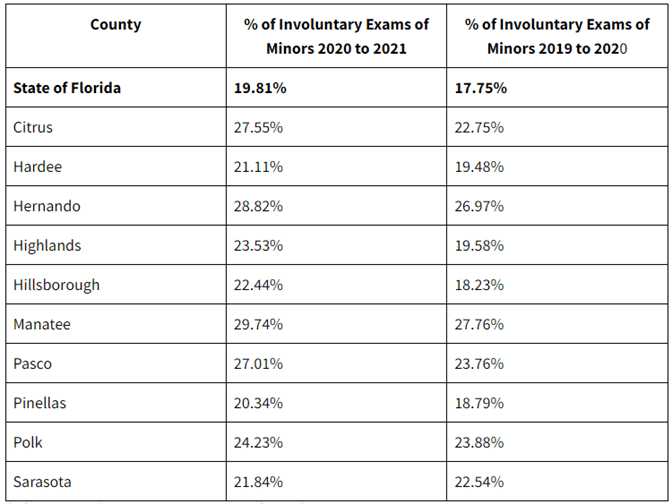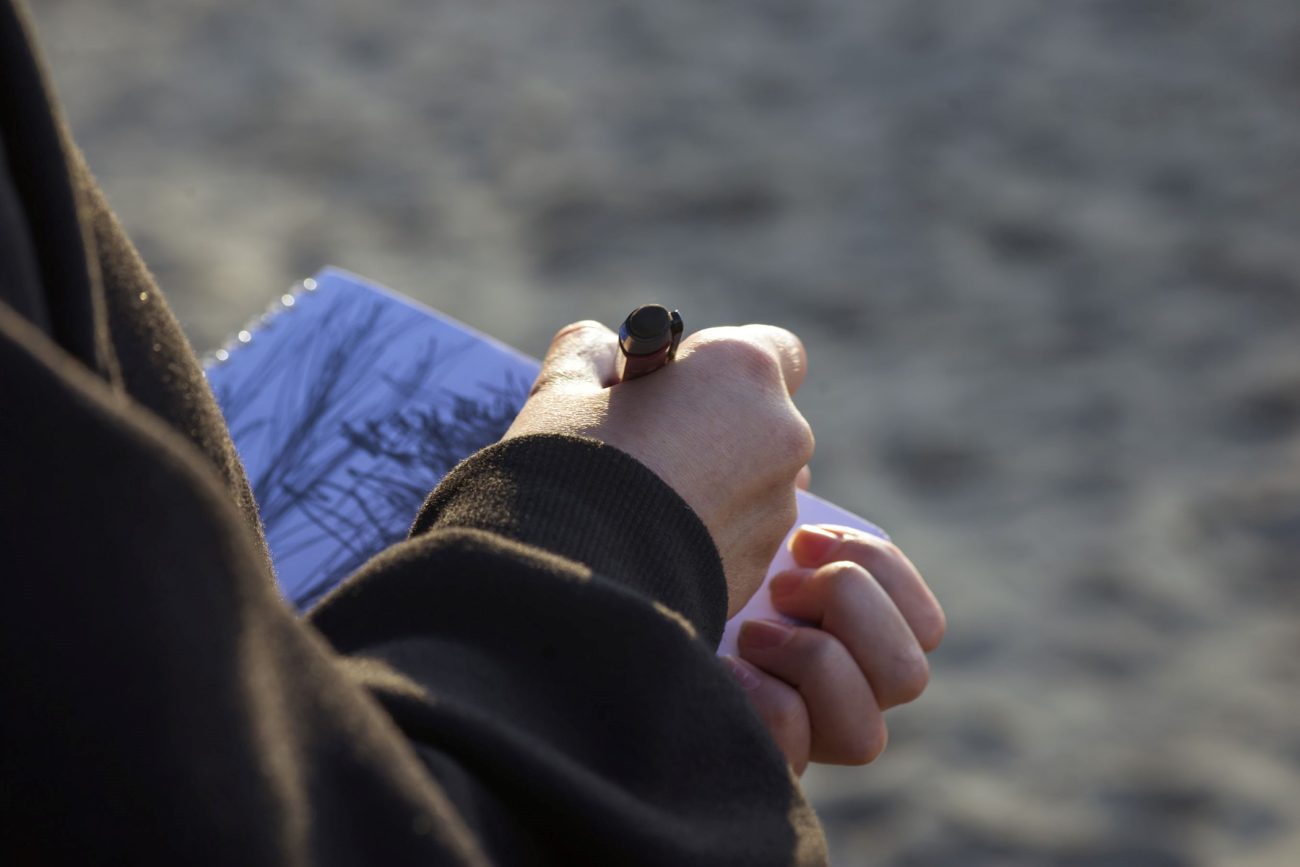More students are being Baker Acted every year across Florida
WKRG | By Sam Sachs | February 27, 2023
TAMPA, Fla. (WFLA) — The number of students in Florida, and across Tampa Bay, taken in for what’s called an involuntary psychological evaluation has grown every year since 2018, according to state data. In Tampa Bay, children make up 20% to nearly 30% of all examinations.
Florida lawmakers have advocated for stronger protections and rights for its teachers to control and handle the classroom, including introducing legislation to create a “Teachers’ Bill of Rights.”
The bill includes provisions for teachers to have more control of how they run their classroom, specifically carving out rules for how to deal with unruly and disruptive students, as well as violent ones.
While safety in the classroom is a priority for both state officials, lawmakers, parents, and teachers, a state report on involuntary mental health and psychiatric examinations of students shows tens of thousands of children in Florida are disciplined with police involvement.
These examinations are due to what’s referred to as the Baker Act, a 1971 Florida law which allows anyone to be involuntarily taken into custody for a mental health or psychiatric examination if they are believed to be a risk to themselves or others.
State reports on the Baker Act, as well as evidence brought to light in lawsuits against some school districts, show the volume of students being “Baker Acted” has risen year-over-year in Florida, unlike the use of other mechanisms for counseling, therapy, or discipline. According to the Southern Poverty Law Center, Florida is a “national outlier” when it comes to these involuntary exams. Nearly 40,000 student examinations occur each year, according to the organization.
“The overuse and abuse of the Baker Act is an issue that affects every county and school district in Florida, which is a national outlier in using its involuntary psychiatric examination statute against approximately 38,000 children each year,” the SPLC said in a statement.
More specifically, state data shows 38,650 involuntary examinations of Florida children occurred for the 2020-2021 fiscal year. The examinations were performed on 25,077 children. Over the last five years, involuntary examinations of children has increased nearly 18%, according to a state study performed by the University of South Florida’s Baker Act Reporting Center.
With the exception of Sarasota County, the counties in the Tampa Bay area all saw the percentage of children Baker Acted in the 2020-2021 fiscal year increase, compared to 2019-2020. Statewide, nearly 20% of all Baker Act involuntary examinations were of minors. Of those, more than one-quarter of the children with involuntary examinations had multiple exams in the same year.
The report says the number of children with multiple involuntary exams made up “a disproportionate number of examinations.”
The Florida Department of Children and Families has rules for how minors are taken in under Baker Act provisions.
“The statutorily established examination period is for up to 72 hours,” according to DCF. “However, for minors, once a Baker Act determination is made, the clinical examination to determine if the criteria for involuntary services are met must be initiated within the first 12 hours of their arrival at the facility.”
An archived report on involuntary examinations of children in Florida written by DCF in 2021 said “the number of involuntary evaluations of children has risen substantially over the last several years.”
DCF said, in the archived and not otherwise publicly available report, that additional factors that may influence use of involuntary exams include:
- Number of people trained in Mental Health First Aid
- Law enforcement training, including Crisis Intervention Training (CIT)
- Availability of criminal justice system diversion programs at all sequential intercepts, including those funded by Criminal Justice, Mental Health, and Substance Abuse (CJMHSA) Reinvestment Grants
- Availability and quality of community-based behavioral health services, including Mobile Response Teams (MRTs), Florida Assertive Community Treatment (FACT) and Community Action Treatment (CAT) Teams
- Availability of a wide array of social services, such as assistance with housing, coverage for health care, and existence of county funds for those who are underinsured or uninsured
- How facilities approach the admission status (voluntary or involuntary) for children based on the logistics of holding the required voluntariness hearing for children
Along with several civil rights advocates and Florida parents, the SPLC has been involved in a court battle over the overuse of the Baker Act on children in Florida. The USF report commissioned by the state showed that “Physicians (who are not Psychiatrists) were the most common health professionals to initiate involuntary examinations,” initiating 64.89% of the initiations for all of Florida.
The SPLC lawsuit, which was started in Palm Beach County, alleges that school district personnel misuse school resource officers and police to “take hundreds of children from their classrooms, put them in handcuffs,” and take them in for psychiatric evaluations via patrol car, all without parents’ consent.
“Some of these children are as young as five,” the lawsuit reads. It also alleges the school district “causes this routine abuse through explicit and customary policies that encourage” Baker Act use via inaccurate training of personnel and a failure to train or monitor how district staff use the provisions of the Baker Act.
Recent court decisions in the lawsuit brought in Palm Beach County have pushed the lawsuit forward in the federal legal circuit.
Judge Aileen Cannon ruled a 2021 report filed by the plaintiffs was correct, agreeing with the report’s conclusions and recommendations for how to handle disciplinary proceedings for students by using alternatives to the Baker Act.
Responding to the judge’s ruling, which did not take an official position on the merits of the case, simply agreeing that there was enough evidence to block motions to dismiss by the Palm Beach School Board, SPLC said in a statement that Cannon’s decision “recognizes the trauma experienced by the children we represent, including that caused by being handcuffed by District police.”
Additionally, SPLC said “the opinion also affirms the constitutional rights of parents to make medical decisions for their children. Schools can only use the Baker Act on children without parental consent in a ‘true emergency.’
The advocacy organization said Cannon had ruled that their clients had successfully alleged that their parental rights were “unconstitutionally deprived” due to the District’s failure to use “ample alternatives” to the Baker Act.
Now, both the school district and the plaintiffs in the case will have additional time to file pre-trial motions, with a March 3 deadline set for whether the parties will proceed on an amended complaint, or move to dismiss the case again.
The DCF says in its history of the law that they must use the least restrictive means of intervention, depending on what each person needs, for patients of all ages. To facilitate some of this work, DCF has what are known as Mobile Response Teams, funded in part by the Marjory Stoneman Douglas High School Public Safety Act.
According to DCF, “the goal of the MRT program is to conduct an independent assessment to determine if the individual may be safely diverted from involuntary examination.”
In FY2020-2021, “MRTs received 22,160 calls; of those, 6,581 were from a school and 16,651 required an acute response. Of the 16,651 calls requiring an acute response, only 3,145 resulted in an involuntary examination.” However, the work of the MRTs is split between 39 teams for all 67 Florida counties. The current state budget for FY2021-2022 set aside additional funding to expand the program.
Here are the most recent Baker Act percentages of minors in Tampa Bay, compared to the previous data set.







